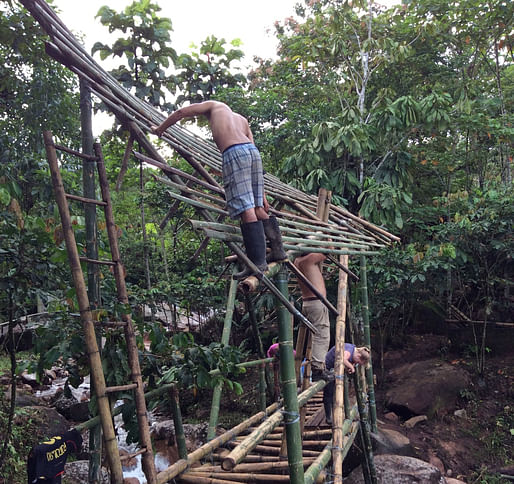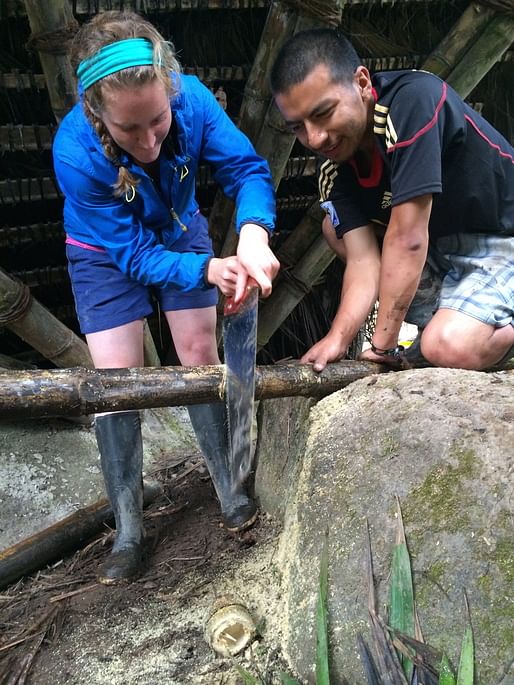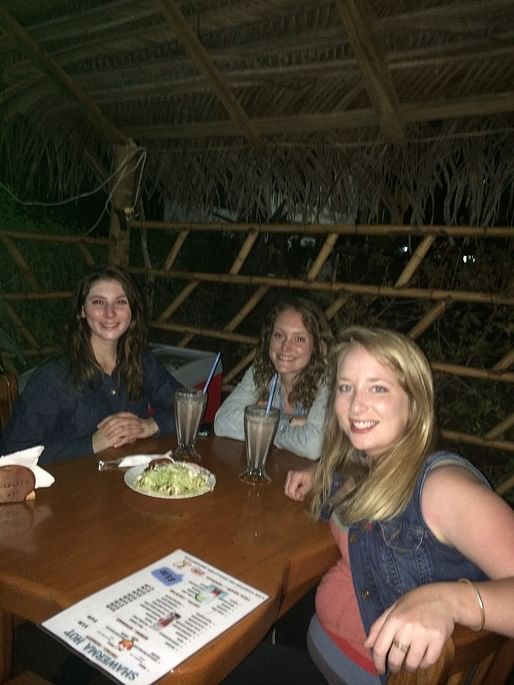
The Taubman College Spring Travel Course Experience is an interview series with students who have participated in the course and want to share their experiences with other students.

Located in Northwestern South America, Ecuador is the most bio-diverse country in the world. With travelers visiting the Galapagos Island and the Amazon rain forests while also learning about the rich indigenous history and culture of the country. In the past few years, the Ecuadorean government has been investing heavily in education and the development of education infrastructure. This gives the field of academia an opportunity to further explore and implement research on topics such as Amazonian urbanism and alternative contemporary design strategies in combination with vernacular methodologies. Among these researches, is that of Ana Maria Duran Castilo’s. Ana Maria is an Ecuadorian architect, researcher, educator and writer. She co-founded the design firm Estudio A0 in 2002, with her partner Jaskran (Jazz) Singh Kalirai, in Quito, Ecuador. She led a group of students to Quito, Ecuador in the spring of 2014 for and will be leading another travel studio course in the spring of 2015.
Ellen Duff, an M.Arch student in her thesis year, and Hillary Davlin, a B.S.Arch student in her senior year, graciously agreed to sit down and answer a few questions on their experience with the course last spring.
Why did you choose to go to Ecuador?
Ellen: I knew I wanted to go abroad to begin with, but I didn't want to go unless there was something I was really passionate about. What intrigued me about going to Ecuador with Ana Maria was that the course was looking at vernacular architecture and how it could be transformed into modern day. Also, I was going somewhere that I wouldn't necessarily go on for vacation to study that stuff is really appealing.
Can you tell us a little bit about your project for the course?
Ellen: We spent two weeks in the Amazon with an Indigenous tribe and we were basically sleeping on nothing with pet tarantulas in our cabin, and were helping that community build a structure out of bamboo. We were learning their old ways of bamboo structure, and they were learning our modern takes and ideas; so we were both advancing and learning as we moved into to project.
The structures that we were involved with were used as a pavilion to showcase the cacao; which is what chocolate is made out of, but they never knew that you could make chocolate out of it. What’s interesting is this fair trade chocolate company came in, Pacari, wanted to give them a way to make money and profit off of the cacao plants that they have been making and trading, which they didn't know what to do with before. They wanted to help them and show them how to make chocolate for tourists. So the tourists weren't coming to their community necessarily but right next to their community so they weren't interrupting with their culture but they can teach tourists how to make chocolate with the plants and get money for it. So our role was helping them make this structure out of bamboo using vernacular techniques. And from that Ana Maria is in charge of IKIAM, a new University in Ecuador, using their new bamboo technology: the basic vernacular of it anyways. We were transcribing that information into sections for the university building. The university stuff was pitched to the team and used as schematic design. The structures included a bathhouse, a pavilion, and a bridge and we specifically helped build the bridge.
Have you been to South America before?
Ellen: No that was my first time!
That was your first time and you slept in the amazon with tarantulas?
Ellen: Yeah it was a full on immersive experience, but honestly the three of us who went are all very outdoorsy and we really like that kind of experience. It was also fun because it was just three girls.
So my experience in the amazon includes death mosquitoes, how was it for you?
Ellen: Honestly I didn't get bit that much, I took a ton of Vitamin B, I was covered in bites at first but after a while, I think they just got used to me maybe?
At this point Hillary joined us and I asked her why she was interested in the Ecuador studio over the other travel studios.
Hillary: I chose Ecuador because it was very different from the European travel abroad courses and I’m sustainability minor so I was much more interested in that aspect of architecture.
What did you get most out of that trip?
Ellen: I think outside of the architectural world, we learned a lot about ourselves; we were always put into situations where we didn’t know what was going to happen, not necessarily dangerous situations, but ones where you really had to think on your feet and overcoming those obstacle while we were there really helped us grow. I think looking back it made a big difference.
So what was the extent of the trip?
Ellen: 4 weeks and Hillary stayed an extra month.
Does this mean you built a bridge in four weeks?
Ellen: No we didn’t get to finish it, there were students in the area that came in and finished it.
Did you get to work with the students while you were there?
Ellen: Yeah, we got to work with one student closely while we were there. But before we got there, the students at the school had designed most of the structures already. We got to work with them for one weekend, there was a large language barrier, but it worked out.
Hillary: We thought we knew Spanish, so before we came in we said, “oh we got this” but it was not the case. It ended up being fine; we learned a few phrases here and there.

Would you say you had to design a lot of things on the field as you go because it wouldn't work how you originally designed it on paper or the computer?
Both: Yeaaaah, a little bit(both laughing).
Hillary: Yeah we had specific parts of the bamboo cut and then we realized it needed to be cut at a different angle so we would just saw it right there while we were building it.

Is there anything you would do differently on the trip?
Ellen: I wish we could have designed more of the original design and had more integration with the University in the process.
Hillary: I think because we hopped on the project later, we didn't have that much say in the project. We got to have our input with the charrette with the IKIAM office, but it would have been nice to have more hands on with the bamboo structure design.
So you came onto the project after it had been designed, was it the students at the University who designed it originally?
Ellen: Yeah it was their studio project.
What is the best advice you can give someone who is interested in this particular travel course, or in general when traveling abroad for the first time?
Hillary: I think being open-minded and flexible. A lot of things happen very quickly and you have to be able to adapt to it.
Ellen: We also didn't need a visa for the trip. If it’s three months or longer you would so to not worry about that. Architecturally speaking though, I feel like a lot of design work happens digitally and even fabrication, you don’t really get your hands dirty and I think that’s one thing we all really liked about the trip is getting your hands dirty as a designer.
What are some unexpected things that you encountered while you were in Ecuador that you had to be flexible with?
Ellen: Airports suck!
Hillary: OMG Yes!
Did they lose your luggage?
Hillary: No they were just old school and did everything by hand so it was really slow.
Ellen: yeah we almost missed our flight to the Galapagos Island.
Hillary: We got there 5 hours early and almost missed it.
So you were able to travel while you were there and not just work?
Ellen: We did a lot of road trips.
Hillary: The amazon and the Galapagos was a big trip.
Ellen: We were in the amazon for two weeks and we went to this National park on a two hour motorized canoe into the amazon where we were drenched in rain.
Hillary: Yeah, I have never experienced that amount of rain.
Ellen: Tori, the other girl on the trip, and I both had two ponchos on and when we were leaving, we were drenched inside our ponchos. Even our tour guide had to bucket out water so we wouldn't sink in the canoe.
Hillary: Yeah, I was holding my camera, crouched over in the canoe …..
Ellen: At one point I didn't even care, just let me swim to shore and stand under a tree….
(Of course it must be noted that they said this all laughingly and wide grins on their faces).

What would you say is the highlight of the trip that you wouldn't trade? Was that one of them?
Ellen: There were so many fun things!
Hillary: I think the part when we went into the national park, even though it was kind of an interesting experience for me with the rain, it was awesome! When we got there we were literally in huts and it was complete darkness and I couldn't see my hands in front of me.
Ellen: There were no walls, and there were alligators sleeping and our tour guide tells us, “well here’s the baby crocodile sleeping,” and we were terrified.
Hillary: This is kind of corny, but there was one part where we went on a night tour and we went on this hike and saw these tarantulas and in the middle of the forest our tour guide told us to stop and turn our headlights off and it was complete silence and you can see the moon and it was beautiful!
Ellen: Yeah I loved that part, but for me just getting to know and working with the indigenous tribe was the best. You got to learn so much about their culture. There was a lot of turmoil between the Indigenous people and having modernized society come in. But about a month before we got there, they were starting to be more amicable and when we were there, we had dinner with the president’s family every night.
Hillary: They were so nice, and we didn't expect them to be; by the time we left the President’s daughter was holding our hands and playing with us.
Ellen: I think they started to understand what we were trying to do and not invade their space in anyway just help them progress their culture.
Do you think the trip has affected in how you see design now?
Ellen: Yes and no. I already had that mindset. But I guess having more hands on experience I think differently now and I pay more attention to the specifics of details.
Hillary: Yeah going off of that, I think a lot more pragmatic about my designs. Going from drawings to full scale is not the same and having that experience really helped how I design and how it would translate at full scale.
So what are some final advice you have for future students on the trip?
Ellen: Be open and be flexible, not in a bad way, just be ready to do things that maybe weren't on the schedule.
Hillary: Yeah just be ready to try new things.
Both: We highly recommend this course, it was a great experience!!

Sharing insights from Taubman College of Architecture and Urban Planning at the University of Michigan.



No Comments
Block this user
Are you sure you want to block this user and hide all related comments throughout the site?
Archinect
This is your first comment on Archinect. Your comment will be visible once approved.